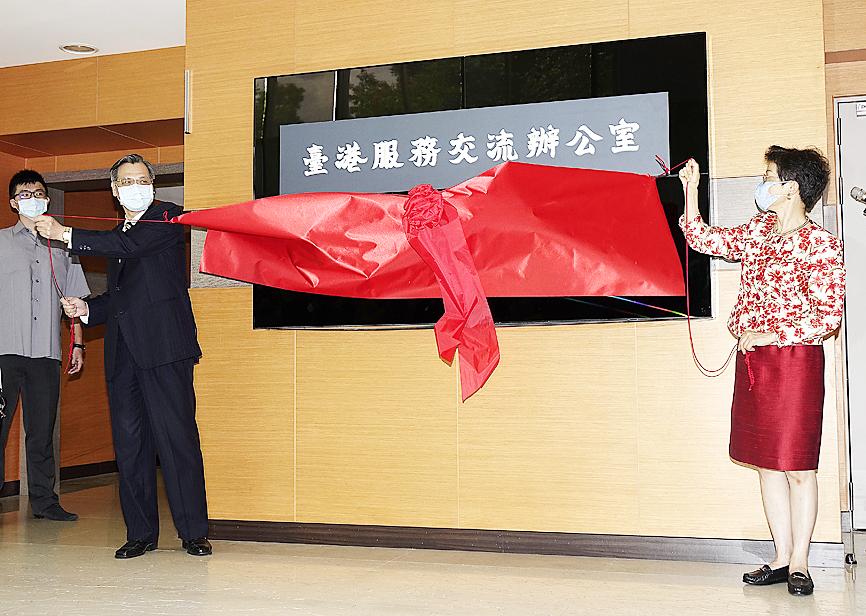The Taiwan-Hong Kong Services and Exchanges Office yesterday officially began operations, marking a milestone in the government’s support for Hong Kongers in their pursuit for democracy and freedom, Mainland Affairs Council (MAC) Minister Chen Ming-tong (陳明通) said.
Chen and Katherine Chang (張小月), chairwoman of the Taiwan-Hong Kong Economic and Cultural Cooperation Council, which oversees the office, yesterday unveiled the new unit’s plaque at a ceremony in Taipei.
The office is tasked with helping Hong Kongers who plan to study, work, invest, start a business or settle in Taiwan.

Photo: Chen Chih-chu, Taipei Times
It would also aid Hong Kongers whose security and freedom are at risk due to political factors on a case-by-case basis, as stipulated in Article 18 of the Act Governing Relations with Hong Kong and Macau (香港澳門關係條例).
Tu Chia-fang (杜嘉芬), a former director of the council’s Department of Hong Kong, Macao, Inner Mongolia and Tibet Affairs, is the new office’s director, while Yu Pi-ru (游璧如), a former senior specialist at the department, is the deputy director.
The office has a staff of 20 and is equipped with 20 telephone lines that offer services in Cantonese. The lines were mostly busy yesterday.
The office’s name plaque uses a font often seen on Hong Kong’s shop signs, showing the government’s expectation of fostering positive interactions with Hong Kongers, Chen said during the ceremony.
Asked about the national security legislation that China imposed on the territory on Tuesday, Chen said that Article 38 would not just affect Hong Kongers, but people worldwide, including Taiwanese.
The legislation would apply to people without permanent residency in Hong Kong if they are found to have committed crimes defined in the act outside Hong Kong, the article states.
Article 29 of the legislation states that people who encourage Hong Kong residents’ hatred for the central government or the Hong Kong government would face a series of outcomes, including prison terms ranging from three years to life, Chen said.
An American might be punished under the legislation if they are found to have criticized Beijing in the US and thus encouraged Hong Kongers’ hatred for Beijing, he said, adding that the act of a crime being committed would be established only if a Hong Konger testified to it.
The legislation is China’s injunction to the whole world, Chen said, urging all countries to pay serious attention to it.
Asked whether the MAC would suspend the Act Governing Relations with Hong Kong and Macau using Article 60 — which stipulates that the Executive Yuan could ask for the president’s approval to suspend the act if the situations in Hong Kong and Macau change and the act’s implementation might endanger Taiwan — Chen said that Taiwan would closely monitor the territory and respond at the proper time.

ENDEAVOR MANTA: The ship is programmed to automatically return to its designated home port and would self-destruct if seized by another party The Endeavor Manta, Taiwan’s first military-specification uncrewed surface vehicle (USV) tailor-made to operate in the Taiwan Strait in a bid to bolster the nation’s asymmetric combat capabilities made its first appearance at Kaohsiung’s Singda Harbor yesterday. Taking inspiration from Ukraine’s navy, which is using USVs to force Russia’s Black Sea fleet to take shelter within its own ports, CSBC Taiwan (台灣國際造船) established a research and development unit on USVs last year, CSBC chairman Huang Cheng-hung (黃正弘) said. With the exception of the satellite guidance system and the outboard motors — which were purchased from foreign companies that were not affiliated with Chinese-funded

PERMIT REVOKED: The influencer at a news conference said the National Immigration Agency was infringing on human rights and persecuting Chinese spouses Chinese influencer “Yaya in Taiwan” (亞亞在台灣) yesterday evening voluntarily left Taiwan, despite saying yesterday morning that she had “no intention” of leaving after her residence permit was revoked over her comments on Taiwan being “unified” with China by military force. The Ministry of the Interior yesterday had said that it could forcibly deport the influencer at midnight, but was considering taking a more flexible approach and beginning procedures this morning. The influencer, whose given name is Liu Zhenya (劉振亞), departed on a 8:45pm flight from Taipei International Airport (Songshan airport) to Fuzhou, China. Liu held a news conference at the airport at 7pm,

GRIDLOCK: The National Fire Agency’s Special Search and Rescue team is on standby to travel to the countries to help out with the rescue effort A powerful earthquake rocked Myanmar and neighboring Thailand yesterday, killing at least three people in Bangkok and burying dozens when a high-rise building under construction collapsed. Footage shared on social media from Myanmar’s second-largest city showed widespread destruction, raising fears that many were trapped under the rubble or killed. The magnitude 7.7 earthquake, with an epicenter near Mandalay in Myanmar, struck at midday and was followed by a strong magnitude 6.4 aftershock. The extent of death, injury and destruction — especially in Myanmar, which is embroiled in a civil war and where information is tightly controlled at the best of times —

Taiwan was ranked the fourth-safest country in the world with a score of 82.9, trailing only Andorra, the United Arab Emirates and Qatar in Numbeo’s Safety Index by Country report. Taiwan’s score improved by 0.1 points compared with last year’s mid-year report, which had Taiwan fourth with a score of 82.8. However, both scores were lower than in last year’s first review, when Taiwan scored 83.3, and are a long way from when Taiwan was named the second-safest country in the world in 2021, scoring 84.8. Taiwan ranked higher than Singapore in ninth with a score of 77.4 and Japan in 10th with